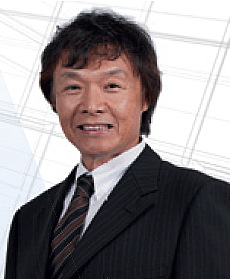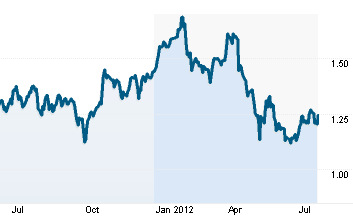
Venue: Regent Singapore, Cuscaden Road
Time & date: 10 am, July 26

Photo: annual report
DESPITE A good turnout of shareholders at the AGM, there were just a handful of questions.
As expected, one of these had to with the absence of dividends. Biosensors, since its listing on the SGX in 2005, has never paid a dividend.
Well, Biosensors International (market cap: S$2.1 billion) isn't planning to pay dividends to shareholders - until it reaches a mature phase in its evolution.
The executive chairman and founder, Yoh-Chie Lu, said: "Our company is in the medical devices sector, which is rapidly growing and the competition is very tough.
"Our goal in order to enhance the value for every shareholder is not to, at this point, declare dividends but rather to continue our growth path to achieve a higher revenue and profit. So at this point, we have no exact and immediate plan to declare dividends."
Shareholder: "When can we expect dividends then?"
Mr Lu: "Once the company has reached maturity and we feel we can confidently say we are in a very strong position to not only grow the company but also share some of the profits with shareholders -- we will definitely do that. We will continue to evaluate and review those things as we go."
Biosensors International develops, manufactures and markets innovative medical devices for interventional cardiology and critical care procedures.
The interventional cardiology division accounted for 93% of the total FY12 product revenue of the group.
This division develops, manufactures and commercializes drug-eluting stents, bare metal stents and angioplasty catheters.
Interventional cardiology contributed 67% of FY12 group revenue. Licensing revenue chipped in another 27.6%.
Biosensors achieved group revenue growth of 87% to US$292.1 million in FY12 ended March 2012.
FY12 net profit excluding exceptional items increased 92% year-on-year to US$101 million.
Operating cash flow was US$81.0 million, a 192% increase from FY11.
The results reflect the consolidation of JW Medical Systems Ltd. in early October 2011 after Biosensors completed its acquisition of the remaining 50% equity interest in JWMS.

M&A action to come
At a special general meeting immediately after the AGM, shareholders voted for a doubling of Biosensors' authorised share capital to US$320,000 comprising 4.8 billion shares.
A shareholder asked if this signalled an intent to do M&A.
It is indeed one of the reasons, replied Mr Lu. "The use of company shares as a currency is not uncommon and we don't take it lightly."
Shareholder: "It's inherently dilutive in nature. I notice the operationg profit per share fell after the JWMS acquisition."
Mr Lu replied that there are shareholders who appreciate the longer-term prospects of Biosensors instead of being satisfied with its current level.
He added that the 1QFY13 results released the evening before showed the fruits of the JWMS acquisition.
> Total revenue hit US$86.3 million, representing 51% year-on-year growth.
> Net profit excluding exceptional items grew 17% year-on-year to US$28.3 million.
> Operating cash flow of US$36.3 million, a more than 10-fold increase year-on-year.
Recent story: BIOSENSORS, GENTING, RAFFLES MEDICAL: What analysts now say.....








Last year full year core earnings per share was 6.7 cents US. This year Q1 core earnings pre share is 1.65 cents, and annualised at about 6.6 cents US (8.25 cents Singapore) a share. So, where is the growth?
At current share price of 1.225, its PE is 15.8x while its realistic price-to-book ratio is 4.5x. Biosensor also has net cash per share of 17.5 cents. Why hoarding on the cash and not declaring dividends for many years?
I cannot understand. What is the motive? I cannot accept growth and not paying dividends. A corporate should do both - grow the profits and pay good dividends.
But a critical question that was not asked is the total world market of its main product (interventional cardiology) and its market share as well as the Board target of future market share or any other related new products in future to sustain continual growth. The question of dividend is quite irrelevant.
I guess that Biosensor is basically a new market entrant, and a small niche company which has been taking the market share from a much bigger competitor.
To sustain the competition and increasing market share, the company must spend on R&D and expanding its marketing capability, and using the internal generated funds would be a prudent management decision. Therefore Biosensor should not pay dividend to shareholders, and shareholders should not expect dividend payout from the accumulated gains.
Note that R&D is an expense or investment that may or may not generated future income. The investors in Biosensors should either trade based on TA, or invest on a long term by ignoring dividend but growth, and growth carried high risks but high returns too. Of course growth is a double edged sword, as it can be negative. So the key financial numbers to track for growth companies is not dividend payout, but revenues growth. If you are using dividend yield as a criteria to investment, this stock will not suit you. But you may trade.